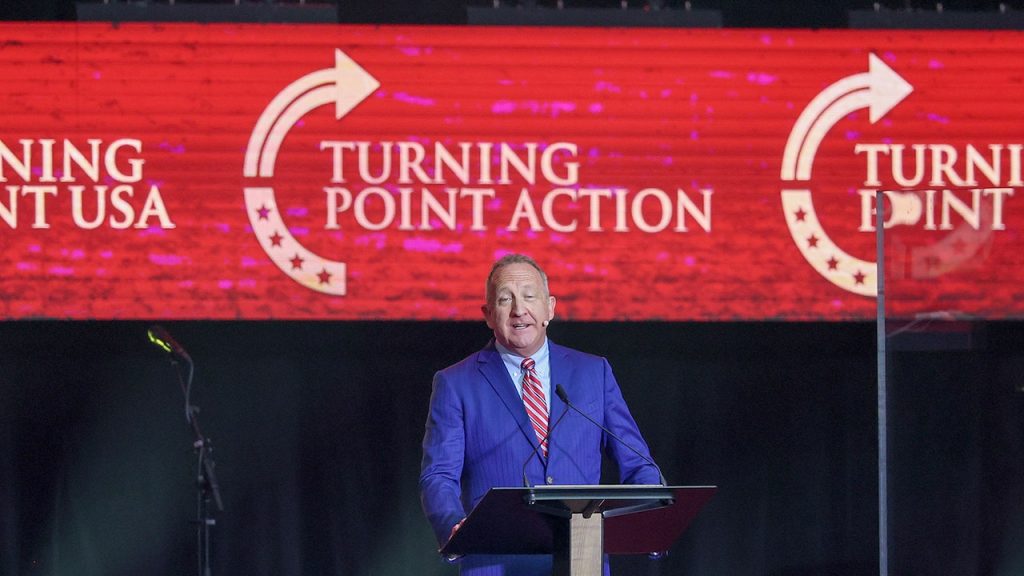Reflecting on Charlie Kirk’s Legacy: Pastor Rob McCoy’s Tribute
A Profound Connection and Sudden Loss
Pastor Rob McCoy, co-chair of Turning Point Faith in California and affectionately known as “Charlie’s Pastor,” opened Charlie Kirk’s memorial service in Glendale, Arizona on September 21st following performances by Christian artists. Having recently retired after 25 years of service at the evangelical Godspeak Calvary Chapel in Thousand Oaks, California, McCoy shared a deep connection with Kirk, who had attended the pastor’s anniversary celebration just a month earlier in August. Since Kirk’s tragic assassination, McCoy has remained steadfast by the Kirk family’s side, offering spiritual guidance and comfort during this unimaginable time of grief. His presence at the memorial service represented not only his personal relationship with Kirk but also symbolized the strong faith foundation that underpinned Kirk’s life and work.
A Life of Extraordinary Impact
During his memorial address, McCoy reflected on the outsized impact of Kirk’s brief but consequential life, noting that Kirk “did in 31 years on this earth… had more lifetimes in 31 years, and all of us have in the entirety of our own.” This poignant observation captured the essence of Kirk’s remarkable ability to maximize his time and influence despite his youth. McCoy also addressed concerns he had perceived among Turning Point USA staffers about the organization’s future without its visionary founder. With reassurance and conviction, McCoy told the gathering, “I looked at each and every one of them… And for those of you who are negative — without Charlie Kirk’s presence, they pulled off the largest event in Turning Point history.” These words served as both a testament to Kirk’s effective leadership in building a resilient organization and as encouragement to those who must now carry his vision forward in his absence.
Faith as the Cornerstone
At the heart of McCoy’s tribute was an emphasis on Kirk’s unwavering Christian faith, which the pastor described as the foundation of Kirk’s life and work. McCoy spoke of how “Charlie knew… at an early age… he entrusted his life to the Savior of the World.” He elaborated on the theological understanding that shaped Kirk’s worldview, explaining that “Jesus came to this earth, was tempted in all ways, yet was without sin, was crucified upon the cross,” and that “His blood was poured out because blood must be shed for the remission of sins.” This faith perspective, according to McCoy, was not merely a personal comfort to Kirk but the driving force behind his public advocacy and the source of his courage in addressing controversial topics. The pastor emphasized that this sacrifice was “sufficient for all the world’s sins, but only efficient for those who, like Charlie, would receive him as their Savior.”
Politics as a Pathway to Faith
One of the most revealing insights McCoy offered about Kirk’s approach to his work came when he explained, “Charlie looked at politics as an on-ramp to Jesus. He knew if he could get all of you rowing in the streams of liberty, you’d come to its source. And that’s the Lord.” This perspective helps explain the integration of faith and political activism that characterized Kirk’s career and the mission of Turning Point USA under his leadership. Rather than seeing political engagement as separate from spiritual concerns, Kirk apparently viewed his political work as ultimately serving a higher purpose—creating conditions where people might discover faith through their pursuit of liberty and traditional values. This framing of Kirk’s motivation presents him not merely as a political strategist but as someone whose political activities were guided by deeper spiritual convictions and evangelistic goals.
A Call to Action
McCoy concluded his remarks with a direct challenge to those gathered at the memorial service, asking attendees to “put action” into their faith and receive God. This call to action served as both a tribute to Kirk’s own active faith and an invitation for others to embrace similar commitments. By framing the appropriate response to Kirk’s death not just as mourning but as spiritual renewal and practical engagement, McCoy effectively transformed the memorial into a moment of potential conversion and recommitment. This approach aligned with Kirk’s own apparent understanding of his mission—not just to influence political outcomes but to impact lives at a deeper level. The pastor’s call represented a continuation of Kirk’s work even in his absence, suggesting that those who wished to honor Kirk’s memory could do so through their own spiritual journeys and civic engagement.
Legacy and Continuity
The memorial service, extensively covered by Fox News Digital through comprehensive online coverage, interviews, local perspectives, live blogging, and digital updates, represented not just the end of Kirk’s life but also a transition moment for the movement he founded. McCoy’s central role in the service, speaking as both a spiritual leader and a close personal friend, helped frame Kirk’s passing within a narrative of faith, purpose, and continuity. While acknowledging the profound loss, McCoy’s message ultimately conveyed hope—both in spiritual terms regarding Kirk’s eternal destiny and in practical terms regarding the ongoing work of Turning Point USA. His reassurance that the organization had already demonstrated its capacity to function effectively even without its founder served as a powerful statement about Kirk’s legacy. The service thus became not only a moment to mourn but also an opportunity to reaffirm the values and vision that Kirk championed, suggesting that while the leader had fallen, the cause would continue.














